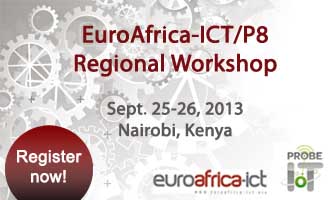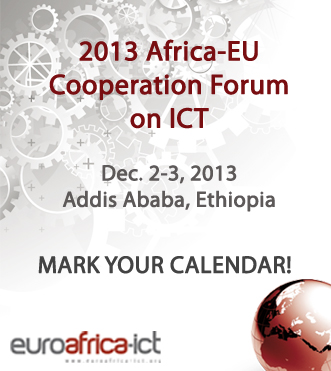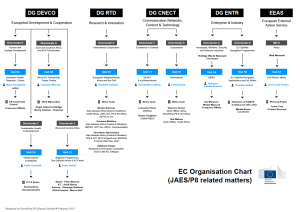2010
28
8th EuroAfrica-ICT Concertation Meeting (June 23, 2010) – Event report
The 8th EuroAfrica-ICT Concertation Meeting, organised by the European Commission (DG INFSO, International Relations Unit) with the support of the EuroAfrica-ICT EU/FP7 funded project, successfully took place on June 23, 2010, at the Radisson Blu Royal Hotel in Brussels, Belgium.
EuroAfrica-ICT concertation meetings have been launched in 2006 and are organised in Brussels on a regular basis with the aim of facilitating closer interaction and the development of synergies between the EuroAfrica-ICT initiative and other related initiatives addressing Euro-Africa S&T cooperation on ICT research.
Moderated by Karine Valin (Managing Director of Sigma Orionis and Project Coordinator of the EuroAfrica-ICT initiative) the meeting was attended by 73 participants from 17 different countries in Europe and Africa, which was divided into three distinct parts: 1/. Cooperation perspectives on ICT with sub-Saharan Africa; 2/. Sharing visions and experiences; 3/. Specific workshop: identifying ICT policy and research priorities. Q&A discussions have taken place at the end of each main session contributing to exchanging visions, ideas and opinions. Also, several breaks throughout the day have been dedicated to develop fruitful networking among all participants.
Cooperation Perspectives on ICT with sub-Saharan Africa
The meeting opening session welcomed representatives from two European Commission Directorates-General: DG Development (DG DEV) and DG Information Society and Media (DG INFSO: International Relations Unit, A4 + GEANT & e-Infrastructures Unit, F3). Roland Zinzius (Deputy Head of Unit ‘Pan African Issues’ Sector at DG DEV and Relations with African, Caribbean and Pacific States) introduced the recent developments and perspectives for the relations between Europe and Africa and provided the meeting attendees with an update related to the implementation of the “Africa-EU Joint Strategy” and action plan. Then Thierry Devars (Scientific Officer, International Relations Unit, DG INFSO) gave a presentation on the recent developments and the perspectives of EU-Africa cooperation on ICT research together with a short overview of the draft ICT Work Programme 2011-2012 and the upcoming “Cooperation Call 7” (FP7-ICT-2010-7). While Leonardo Flores (Scientific Officer, International Cooperation, ‘GEANT & e-Infrastructures’ Unit, DG INFSO) updated the event participants on the AfricaConnect and the FEAST feasibility study for interconnection of sub-Saharan Africa to GEANT. Mr Flores also introduced the upcoming “Capacities Call 9 “(FP7-Infrastructures-2011-2).
Sharing vision and experiences
The second session provided several concrete examples of EU-Africa S&T Cooperation initiatives: several speakers from different European and African Countries presented their personal experience and expertise in this field. Nicolas Chevrollier (ICT4D Team Leader of TNO Information and Communication Technology – Netherlands) looked at the mobile services as a mean to produce better health in rural areas (Innovation for development). Christian Merz (Senior Researcher, SAP Research – Germany) presented the Living Lab methodology and evolution in South Africa as a successful system for building future economy, highlighting the opportunities and positive implications created by this system in the developing world in general. Daan du Toit (Minister Counsellor S&T, South African Mission to the EU, DST – South Africa) made a more general presentation on South Africa’s participation in FP7 ICT cooperation activities, pointing out that South Africa is the forth biggest partner of Europe in ICT, after USA, Russia, China and India. Several initiatives, projects and activities are enhancing the Country’s participation in the Programme, which is constantly increasing. James Waterworth (Director, EU Representatives Office, Nokia – Belgium) focused on the mobile technologies as a key sector to create sustainable businesses in the Knowledge Economy, having a high potential and several possible applications in different sectors (e.g. Agriculture, Health, etc.). Mohamadou Arabani Saibou (Director, ESMT – Senegal) illustrated problems and expectations encountered by the African organisations when taking part in European projects: an interesting case study to understand why it is difficult for an African organisation to participate in European projects. Bernard Yvetot (Vice President, Strategy International Business, France Telecom / Orange – France) presented the France Telecom / Orange’s strategy in Africa and how it can contribute to the development of telecommunication services in the Country. More and more mobile services will be available in the coming years: the mobile banking has already transformed the way people transfer money (successful initiatives in Ivory Coast, Senegal, Mali, Madagascar). David Cromar (Director, Solvebrand – United Kingdom) closed the session illustrating the idea of growing Africa through Incubation. This system is founded on the behalf that we need to share our learning and to support each other: the creation of a business incubator enhance the economic promotion of a region, the diversification of the local economy, the transfer of technology, the creation of new jobs and skills in a community. The African Incubator Network aims at developing a collaborative network of African incubators and other business development service providers, and at facilitating the provision of appropriate knowledge to support the development of innovative small enterprises.
Specific workshop: identifying ICT policy and research priorities
The last session of the day – chaired by Daan du Toit (Minister Counsellor S&T, South African Mission to the EU, DST – South Africa) – started with a presentation of Andrew Cherry (the Africa Unit, ACU and EuroAfrica-ICT project partner – United Kingdom). Through this specific workshop, Andy introduced to the audience the work undertaken so far by the EuroAfrica-ICT project in identifying Euro-Africa ICT policy and research priorities and the obtained preliminary results. Andrew Cherry presented the different steps of the methodology which will be used to identify the relevant research priorities which will lead to recommendations to be taken into consideration in facilitating the rapid emergence of Euro-African collaborative projects addressing identified ICT research areas (consultation, analysis, recommendations and validation). Then Daan du Toit led the following debate: people were asked to give their opinion and suggestions on the set out methodology, in what can be considered as the first public consultation of the task. The result was a series of comments and views which helped the EuroAfrica-ICT initiative to understand what are the general feelings of people towards the proposed methodology. A series of ICT research priorities were suggested as well: mobile telephony, transport & technology, e-Education, e-Libraries, e-Environment, etc.
What emerged is that a bottom up approach is useful to get a background orientation on what people expect and is of high interest to the European Commission. However, to understand specifically what should be done and why, a public consultation is necessary to involve in the dialogue all stakeholders, industry associations and other relevant players with strong industry focus, in order to obtain a set of well motivated ideas on how to concretely proceed.
Presentations, agenda and attendees list are available here.









